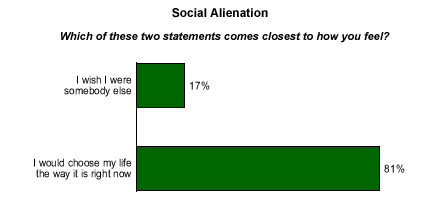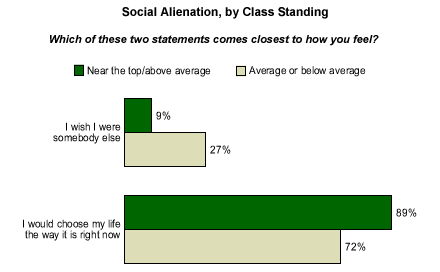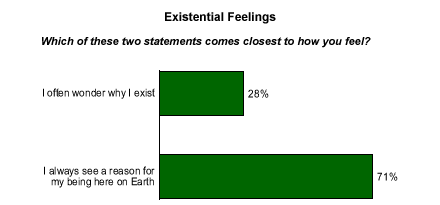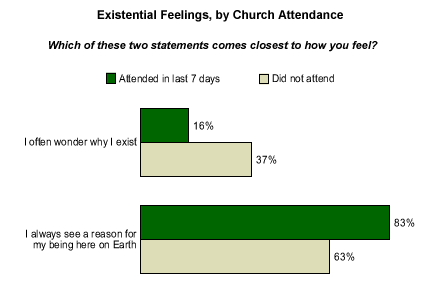Teenagers walk a fine line between childhood and adulthood, often tripping back and forth over it for years. During adolescence, teens begin to compare themselves with those around them, define their world, and consider where they fit into it. It’s a difficult process, and for many teens, it’s also often a lonely one. The most recent Gallup Youth Survey* asked several questions designed to gauge the average level of alienation among teens, and look at factors that might be related to feelings of isolation or insignificance.
Happily, the resulting data suggest that most teens are content with who they are. When given a choice between two statements, 81% of teens chose the statement, "I would choose my life the way it is right now," while only 17% thought the statement, "I wish I were somebody else," better described their feelings.

The data indicate that teens who rate themselves higher on the academic ladder are more satisfied with their place in the world. Just 9% of teens who rate their class standing as "near the top" or "above average" said they wish they were somebody else, compared with 27% of teens who said they are "average" or "below average." These findings may suggest teens’ successes in the classroom may spread outside of it and into other aspects of their lives.

Existential Questions
Sometimes, teens’ feelings of isolation can run even deeper than concerns about social acceptance -- some appear to have doubts about their place in the universe, although this is a relatively small group. Asked to choose between the statements, "I always see a reason for my being here on Earth," and "I often wonder why I exist," 71% said the former comes closest to how they feel, while 28% chose the latter.

Many religions teach there is a divine plan for everyone, which may reassure young churchgoers that there is a reason for them, personally, to be on Earth. That might explain why a higher proportion of churchgoing teens (83%), than non-churchgoing teens (63%), said they always see a reason for their existence.

Thirty-six percent of teens who wonder why they exist said they drink alcohol, compared with 13% of teens who said they always see a reason for being here on Earth and also said they drink. Similarly, 25% of teens who ponder their existence said they have tried marijuana, compared with 8% who always see a reason for their being here and also said they have tried marijuana. One logical interpretation is that teens who feel less grounded than their peers are more likely than other teens to seek comfort in alcohol and engage in other risk behaviors.
Bottom Line
Coping with feelings of alienation -- especially within the entrenched social hierarchies of middle schools and high schools -- can be difficult for vulnerable teens. The rash of school shootings since the 1990s has shown that the resulting anger and frustration can lead to destructive behavior. Following the Columbine shootings, Case Western Reserve psychologist Roy Baumeister noted that: "social rejection seems to undermine self-regulation, making negative behaviors more likely." While it would be impossible to prevent teenagers from feeling alienated altogether, it behooves parents and teachers to do everything they can to understand the factors related to those feelings.
*The Gallup Youth Survey is conducted via an Internet methodology provided by Knowledge Networks, using an online research panel that is designed to be representative of the entire U.S. population. The current questionnaire was completed by 517 respondents, aged 13 to 17, between Aug. 1 and Aug. 29, 2003. For results based on the total sample, one can say with 95% confidence that the maximum margin of sampling error is ±5 percentage points.